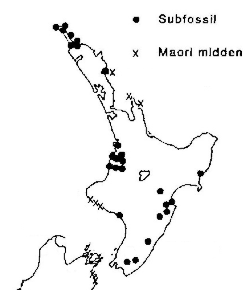North Island takahē
| North Island takahē | |
|---|---|
 |
|
| Fossil cranial remains of P. mantelli (7-13) compared to those of a smaller, extant member of Porphyrio | |
| Scientific classification | |
| Kingdom: | Animalia |
| Phylum: | Chordata |
| Class: | Aves |
| Order: | Gruiformes |
| Family: | Rallidae |
| Genus: | Porphyrio |
| Species: | P. mantelli |
| Binomial name | |
|
Porphyrio mantelli (Owen, 1848) |
|
 |
|
| Locations where fossils have been found | |
The North Island takahē or mōho (Porphyrio mantelli) is an extinct rail that was found in the North Island of New Zealand. This flightless species is known from subfossils from a number of archeological sites and from one possible 1894 record (Phillipps, 1959). It appeared to have been even larger than the South Island takahē and, if it did survive until the 1890s, would have been the largest rail in historic times. The decline of the species has generally been attributed to the increasing incursion of forest into the alpine grasslands through the Holocene, although hunting by the Māori also played a major role.
Traditionally the North Island takahē was considered conspecific with the threatened South Island takahē P. hochstetteri. Trewick (1996) presented evidence that the two taxa were independently derived from flying ancestors, so proved to be separate species.
The binomial of this bird commemorates the naturalist and civil servant Walter Mantell.
...
Wikipedia

